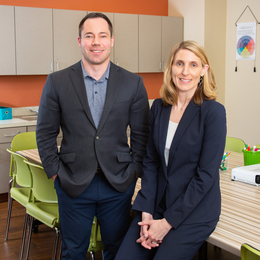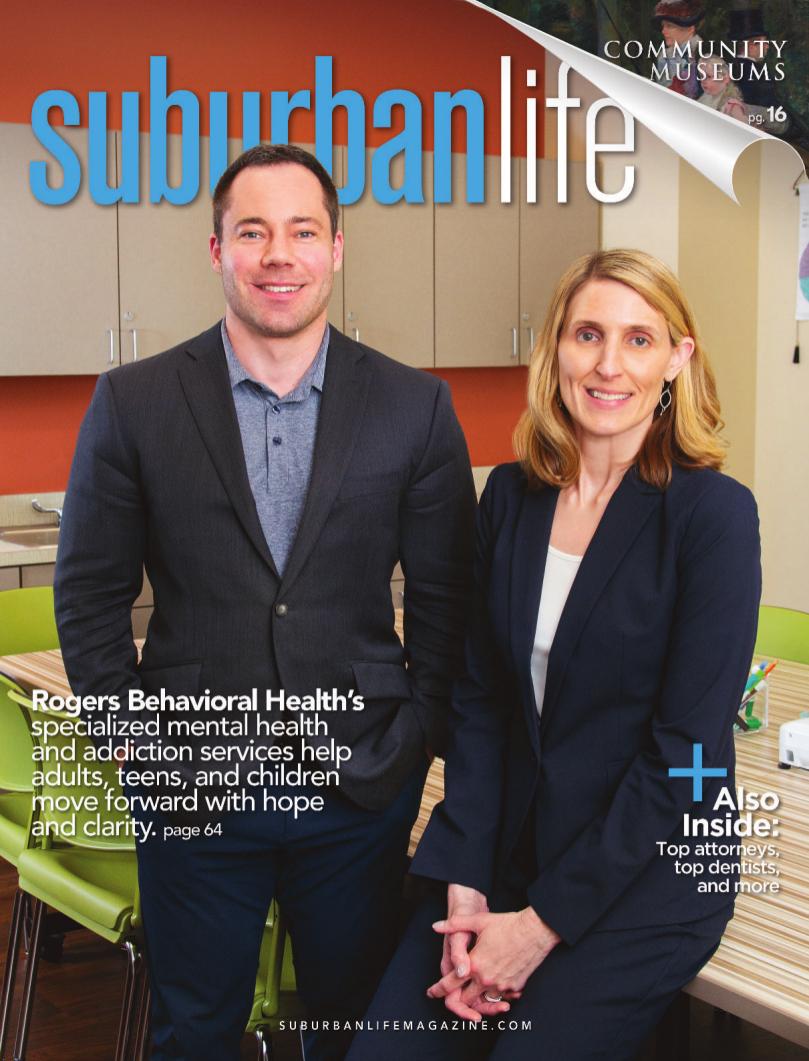
On Stable Ground
Rogers Behavioral Health’s specialized mental health and addiction services help adults, teens, and children move forward with hope and clarity.
Matt Boyer, M.D., was in the third year of his psychiatric residency at Northwell Health in New York when he had the opportunity to work closely with people who were struggling with substance use and addiction. The experience not only clarified his career path but also changed his life.
“There’s so much stigma surrounding addiction, even though all of us have been touched by addiction in some way,” says Dr. Boyer, a psychiatrist with Rogers Behavioral Health in the Wynnefield Heights neighborhood of Philadelphia. “There are a lot of sad stories, but one of the best things I learned in my residency and in my addiction fellowship at NYU [Langone Health] is that you hear a lot of hope in those stories, too.”
At Rogers Behavioral Health, Dr. Boyer is a vital part of a multidisciplinary team devoted to providing specialized mental health and addiction services for adults, teens, and children in the Philadelphia area. In addition to serving as the attending physician for adult programs supporting the Depression Recovery and OCD/Anxiety Treatment tracks at Rogers, he oversees the Mental Health and Addiction Recovery Program for patients who struggle with opioid, drug, and alcohol addiction, or mental health disorders paired with a co-occurring addiction.
Rogers started accepting patients into the Mental Health and Addiction Recovery Program in April, though Dr. Boyer has been involved in the program’s creation since 2021. At present the program can accommodate 10 patients, with plans to ramp up to as many as 20.
Each patient’s introduction to the Mental Health and Addiction Recovery Program begins with a comprehensive evidence-based assessment. The results of the assessment help determine if the individual would be best served by specialized partial hospitalization (six hours a day, five days a week) or intensive outpatient care (three hours a day, five days a week); both options allow a patient to receive care in a bright, clean, and supportive environment while staying at home and maintaining a regular schedule outside of treatment hours.
A treatment plan might include modalities such as cognitive behavioral therapy, dialectical behavior therapy, and medication management, among other evidence-based interventions. The program can administer all FDA-approved medications for addiction recovery, with the exception of methadone, as well as medications for psychiatric disorders. For people who may not be entirely ready to stop using, the plan might also include a harm-reduction component; naloxone is widely available.
“When someone is struggling with addiction, there’s usually a comorbid psychiatric disorder as well,” Dr. Boyer says. “We’ve worked hard to make sure we treat both concurrently. The treatment is largely group based, because we find being part of a community helps with retention, but it also has time for individual care. We also provide network therapy, which is another evidence-based modality that incorporates their family and peers.”
If a patient’s comorbidity happens to be obsessive-compulsive disorder (OCD) or a related anxiety disorder, the patient’s multidisciplinary team could very well include Beth Reeder, Ph.D., a clinical supervisor and licensed clinical psychologist with Rogers.
For those who are unfamiliar with the disorder, OCD causes individuals to have unwanted thoughts and fears known as obsessions, which in turn stimulate repetitive behaviors, or compulsions. These obsessions and compulsions combine to cause daily distress and interruptions—not only for the child, teen, or adult who has the disorder, but also for those around them.
Dr. Reeder has worked with OCD patients from ages six to 82, though the majority of her patient population consists of young adults. After a comprehensive assessment, Dr. Reeder or another OCD and anxiety specialist works with each patient individually to develop an exposure hierarchy, set goals, and otherwise guide the patient forward. OCD may be a lifelong condition, but Dr. Reeder wants each patient to leave Rogers’ care having learned how to function more effectively in the midst of anxiety.
“OCD makes the sufferer’s world small,” she says. “It’s not an easy condition to live with, but it does get better with treatment.”
OCD shaped Dr. Reeder’s life from an early age. She says her older brother and younger sister both had the disorder, which “affected my family in every way.”
“The families we see are severely impacted,” she adds. “A parent’s instinct is to nurture and to help, so what often happens is that when a child is very anxious, a parent will intervene to help reduce those feelings of anxiety by reassuring the child. This is what we call an accommodation behavior. The accommodation serves the same purpose as the ritual, so you’re essentially robbing the child of the opportunity to sit with this distress and learn how to cope.”
Dr. Reeder is currently collaborating with researchers from the Yale School of Public Health to study OCD patients and their relatives to better understand the role of family accommodation in the treatment of OCD. The goal: to develop more effective ways of addressing family accommodation in the context of behavioral treatment.
Rogers has long been known as a pioneer in the field of mental health. The organization has been providing pathways to recovery for more than a century, and in that time it has widened its footprint across the country. Considering its history and the scope of its work, Rogers has become a leader in research that’s shaping the conversation around the treatments and therapies of tomorrow.
Martin E. Franklin, Ph.D., spent several decades in academia before joining Rogers full-time in 2019. He published widely during his 20 years on faculty at the University of Pennsylvania’s Department of Psychiatry, and he continues to do so this day. In fact, he was the lead author of a research paper published in a 2024 edition of JAACAP Open, a peer-reviewed, open-access journal of the American Academy of Child and Adolescent Psychiatry. The paper examined the efficacy of multimodal treatment, including intensive cognitive-behavioral therapy, for pediatric OCD delivered via telehealth during the COVID-19 pandemic.
One of the most remarkable aspects of the study involved the sample size—nearly 1,300 youths, ages seven to 17—a number Dr. Franklin describes as “five times larger” than that of any prior study pertaining to OCD. He credits Rogers Chief Strategy Officer Brian Kay, Ph.D., for his visionary work in streamlining Rogers’ data-collection process.
“We’ve been doing this work for a long time, so we have a lot of data,” Dr. Franklin says. “I’m an expert in pediatric OCD, but we could literally do the same [study] with every service line we have: eating disorders, trauma, depression. … In the next three or four years, we’re likely to publish 25 to 30 papers in top-tier journals about the work we’re doing at Rogers.”
The thinking is that cutting-edge research will in turn lead to cutting-edge patient outcomes—within the Rogers network and elsewhere. As a result, Dr. Franklin believes Rogers will be “in a position to change the entire field” of mental health treatment for children and adults within the next five years.
“We need to do better,” says Dr. Franklin, who recently turned 60. “I want to spend the next 10 years honing my craft, getting better treatment [for patients] beyond the academic centers, and mentoring the next generation of scientists [such as Rogers research psychologists Rachel Schwartz, Ph.D., and Hana Zickgraf, Ph.D.]. Even if I stay for a decade and do everything I set out to do, this work will not be done.”
Like Drs. Boyer and Reeder, Dr. Franklin ties his career trajectory to experiences from his formative years. His father, an Irish immigrant who came to the United States in the 1950s, spent much of his adult life helping alcoholics find and maintain sobriety.
“I watched my dad bring people into the house who were at their lowest points,” he recalls. “He’s the one who got me to understand that there’s more to life than making money. ‘Are you helping people, or are you not?’ He’s the one who put that in my head. I feel like I’m doing that at Rogers, and I’m surrounded by great people who are doing the same.”
Rogers Behavioral Health
1 Winding Drive, Suite 106
Philadelphia, PA 19131
(800) 767-4411 | (267) 787-6600
rogersbh.org/locations/philadelphia
1 Winding Drive, Suite 106
Philadelphia, PA 19131
(800) 767-4411 | (267) 787-6600
rogersbh.org/locations/philadelphia
Photo by Alison Dunlap
Published (and copyrighted) in Suburban Life, April 2024



